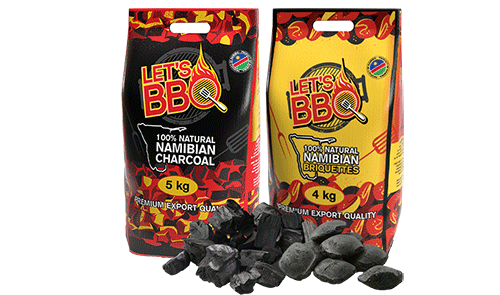Namibia’s potential to enhance charcoal competitiveness in the global marketplace remains hindered by branding issues. This major challenge remains a critical barrier to market infiltration because charcoal produced in Namibia is still branded with logos of international companies.
“International charcoal buyers are protecting their market and prioritising branding imported products with their logos to keep their clients,” reads a recent report analysing the industry.
This situation creates a dilemma for Namibian suppliers because if domestic products are eventually branded with local details, international clients may prefer to select more well-known international products. This is despite international products actually being Namibian in origin. This underscores the continued control exerted by global markets.
The recent report highlights that Namibia currently lacks the market capacity to demand effective branding on an international scale.
“Global companies dominate and protect their direct consumer bases, making it difficult for local producers to establish a foothold. Additionally, establishing distribution lines in lucrative markets like Europe is prohibitively expensive, further complicating branding efforts for Namibian products,” the report added.
These findings are detailed in the Charcoal Industry Sustainability and Diversification, Final Scoping report, published in October 2024, and submitted to the National Planning Commission.
A practical strategy suggested in the report involves targeting smaller niche markets internationally for branding initiatives.
The study aims to enhance diversity and sustainability in Namibia’s charcoal industry by fostering an inclusive environment that supports startups and indigenous producers.
Local authorities are encouraged to negotiate with international buyers to ensure Namibia and the Namibian flag are prominently featured on all domestic charcoal packaging on international markets.
The report added that while challenges persist, there is a pathway forward for Namibia’s charcoal industry through strategic branding and collaboration with international partners.
Another challenge identified is that the cost of freight exceeds the actual price of charcoal as a product, and Namibia faces competition from Nigeria, Egypt and Vietnam due to proximity to international markets. This harms the competitiveness of Namibian charcoal on the international market.
One of the recommendations is to capacitate stakeholders to produce high-quality charcoal through enhanced technology to augment Namibia’s global competitiveness.
“Establish a charcoal production facility to ensure consistent charcoal supply and meet market demand. Negotiate with shipping lines to lower freight costs and with buyers to increase prices, leveraging Namibian charcoal’s high standards and sustainability. As a result, the competitiveness of charcoal in the international market will be improved. Research on safer charcoal transport methods could also significantly reduce freight risks and costs,” the report recommends.
Namibia ranks as the fifth- largest charcoal exporter globally, exporting around 210 000 tonnes mainly to South Africa and Europe.
Only about 1% of the total annual production is sold locally. -mndjavera@nepc.com.na



